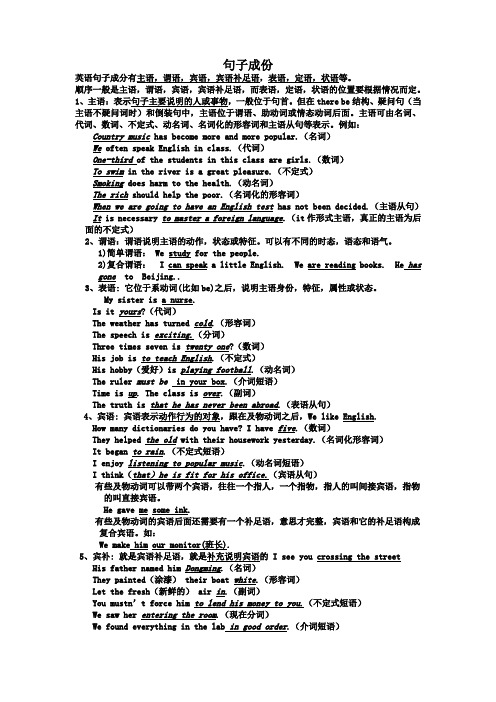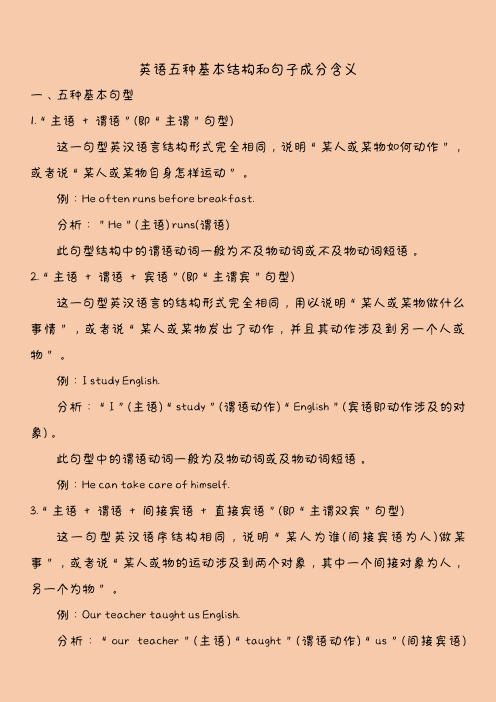英语的句子成分及五大基本句型
英语句子成分和五种基本句型

句子成份英语句子成分有主语,谓语,宾语,宾语补足语,表语,定语,状语等。
顺序一般是主语,谓语,宾语,宾语补足语,而表语,定语,状语的位置要根据情况而定。
1、主语:表示句子主要说明的人或事物,一般位于句首。
但在there be结构、疑问句(当主语不疑问词时)和倒装句中,主语位于谓语、助动词或情态动词后面。
主语可由名词、代词、数词、不定式、动名词、名词化的形容词和主语从句等表示。
例如:Country music has become more and more popular.(名词)We often speak English in class.(代词)One-third of the students in this class are girls.(数词)To swim in the river is a great pleasure.(不定式)Smoking does harm to the health.(动名词)The rich should help the poor.(名词化的形容词)When we are going to have an English test has not been decided.(主语从句)It is necessary to master a foreign language.(it作形式主语,真正的主语为后面的不定式)2、谓语:谓语说明主语的动作,状态或特征。
可以有不同的时态,语态和语气。
1)简单谓语: We study for the people.2)复合谓语: I can speak a little English. We are reading books. He hasgone to Beijing..3、表语: 它位于系动词(比如be)之后,说明主语身份,特征,属性或状态。
My sister is a nurse.Is it yours?(代词)The weather has turned cold.(形容词)The speech is exciting.(分词)Three times seven is twenty one?(数词)His job is to teach English.(不定式)His hobby(爱好)is playing football.(动名词)The ruler must be in your box.(介词短语)Time is up. The class is over.(副词)The truth is that he has never been abroad.(表语从句)4、宾语: 宾语表示动作行为的对象,跟在及物动词之后,We like English.How many dictionaries do you have? I have five.(数词)They helped the old with their housework yesterday.(名词化形容词)It began to rain.(不定式短语)I enjoy listening to popular music.(动名词短语)I think(that)he is fit for his office.(宾语从句)有些及物动词可以带两个宾语,往往一个指人,一个指物,指人的叫间接宾语,指物的叫直接宾语。
英语句子成分及五种基本句型

1. This is an English-Chinese dictionary. 这是本英汉辞典。
2. The dinner smells good.
午餐的气味很好。
3. Everything looks different.
一切看来都不同了。
4. He is growing tall and strong. 他长得又高又壮
什么可以作谓语?
We love China. We have finished reading this book. He can speak English.
及物动词 vt
My mother usually gets up early. The boy often plays in his yard. 不及物动词 vi
基本句型3: 主+谓+宾
例句 他时常弹吉他。 A
例句B 我想喝杯茶。
例句C 我不知道什么时候离开这儿。
例句 我承认伤害了你。 D
Tip 1
某些特定的动词习惯于用动词不定式作为其宾语,如: attempt,decide,expect,hope,learn,need, pretend,promise,refuse,want,wish等
I’d like to have some coffee.
动词不定式
I enjoy working with you.
动名词
I think you are right.
宾语从句及复合宾语
I really don’t know what to do next.
思考: 一个句子中若可以存在宾语,其谓语动词应该具备 什么特点呢?
基本句型3: 主+谓+宾
英语基本五大句型以及成分讲解

(五)宾语
• 宾语(Object)表示动作的对象或承受者,一 般位于及物动词和介词后面。例如: 1.He is doing his homework.
(名词)
2.The heavy rain prevented me from coming to school on time. (代词、动名词) 3.How many dictionaries do you have? I have five.
(四)表语
• 表语(Predicative)
• 用以说明主语的性质、特征、状态与身份, 它一般位于系动词(如be, become, get, look, grow, turn, seem等)之后。 • 表语一般由名词、代词、形容词、数词、 副词、不定式、动名词、分词、介词短语 及表语从句表示。例如:
(不定式短语)
4.He is in the room making a model plane.
(分词短语)
5.Wait a minute.
(名词)
6.Once you begin, you must continue.
(状语从句)
9种状语种类如下:
1. How about meeting again at six? (时间状语) st night she didn’t go to the dance party (原因状语) because of the rain. 3.I shall go there if it doesn’t rain. (条件状语) 4.Mr Smith lives on the third floor. (地点状语) 5.She put the eggs into the basket with great care. (方式状语)
英语句子成分和五种基本句型

以上两个句型可以互换: He gave me a pen.=He gave a pen to me. He will buy me some books.=he will buy some books for me. She made me a cake.=she made a cake for me. 4. “疑问词+不定式”作直宾 He taught me how to read the word. She asked me which way to go. I told him what to do. He asked me why to sing this song.
宾语补足语
在英语中,有些句子里只有宾语并不能表达
完整的意思,还必须在宾语后面加上宾语补 足语才能表达完整的意思。我们把“宾语+宾 语补足语”称为复合宾语。名词、形容词、 副词、介词短语、不定式、现在分词、过去 分词都可以做宾语补足语。通常位于宾语之 后。
If
you let me go, I will make you king. Leave the door open. We found Li Ming out when we arrived. Make yourself at home. The manager asked him to wait. I saw her enter the shopping mall. The boss kept him working all day. Yesterday he got his leg broken.
状语
状语用来修饰动词、形容词或副词。一般表示行
为发生的时间、地点、目的、方式、程度等意义, 常由副词、介词短语、不定式、句子或相当于副 词的词或短语来表示。一般放在句末,有时可以 放在句首、句中。 He did it carefully. Without his help, we couldn’t work it out. (In order) to catch up with my classmates, I must study hard. Just as I was leaving, the phone rang again.
英语句子成分及五大基本句型精讲

英语五种基本结构和句子成分含义一、五种基本句型1.“主语+ 谓语”(即“主谓”句型)这一句型英汉语言结构形式完全相同,说明“某人或某物如何动作”,或者说“某人或某物自身怎样运动”。
例:He often runs before breakfast.分析:”He”(主语) runs(谓语)此句型结构中的谓语动词一般为不及物动词或不及物动词短语。
2.“主语+ 谓语+ 宾语”(即“主谓宾”句型)这一句型英汉语言的结构形式完全相同,用以说明“某人或某物做什么事情”,或者说“某人或某物发出了动作,并且其动作涉及到另一个人或物”。
例:I study English.分析:“I”(主语)“study”(谓语动作)“English”(宾语即动作涉及的对象)。
此句型中的谓语动词一般为及物动词或及物动词短语。
例:He can take care of himself.3.“主语+ 谓语+ 间接宾语+ 直接宾语”(即“主谓双宾”句型)这一句型英汉语序结构相同,说明“某人为谁(间接宾语为人)做某事”,或者说“某人或物的运动涉及到两个对象,其中一个间接对象为人,另一个为物”。
例:Our teacher taught us English.分析:“our teacher”(主语)“taught”(谓语动作)“us”(间接宾语)“English”(直接宾语)。
4.“主语+ 谓语+ 宾语+ 宾语补足语”(即“主谓宾宾补”句型)这一句型说明“某人或某物要求(使、让)某人做什么”或“某人感觉某人或物怎么样”。
例:Our teacher asks us to write a short story..分析:“our teacher”(主语)“asks”(谓语动作)“us”(宾语即动作涉及的对象)“to write a short story”(补语--补充说明宾语做什么)。
5.“主语+ 系动词+ 表语”(即“主系表”句型)这一句型用以说明“某人(某物、某事、某种概念)具有什么特征或处于什么状态”。
英语句子成分及简单句5种基本句型

英语句子成分及简单句5种基本句型一、英语句子成分根据英语词汇在英语句子中的地位和作用, 英语句子的成分可分为主语、谓语、宾语、宾语补足语、表语、定语、状语、同位语及独立成分等。
其中,主语和谓语是句子的主要成分,一般情况下,一个句子不能缺少这两种成分。
现将不同句子成分的用法列举如下:1. 主语:表示句子所要说明或描述的人或事物,一般由名词、代词或相当于名词的词组或句子充当,置于句首。
如:It's getting cold. 天冷起来了。
Now everything is ready. 现在一切都准备好了。
The teacher is very kind to us. 老师对我们很好。
2. 谓语:说明或描述主语的动作、状态或特征,由动词或动词短语充当,位于主语之后。
如:Mother bought me a birthday present. 妈给我买了个生日礼物。
We have finished our work already. 我们已经完成了工作。
3. 表语:表示主语的身份、性质、状态和特征,一般由名词、形容词、或相当于名词、形容词的词、短语或句子充当,位于系动词之后,形成英语独有的主系表结构。
如:Be careful! 小心!All the students are lovely. 所有的学生都很可爱。
He looks very angry. 他看上去很生气。
4. 宾语:指动作所涉及的人或事物,一般由名词、代词或相当于名词的词组或句子充当,位于动词之后。
如:He wrote many plays. 他写了许多剧本。
She loves swimming. 她喜欢游泳。
5. 宾语补足语:用来对宾语进行补充和说明,一般由名词、形容词、副词、介词短语或非谓语动词充当。
如:He told us to stay. 他叫我们留下。
I've never seen her dancing. 我从未看见过她跳舞。
英语5大基本句型!!
英语五个基本句式及句子成分(basic sentence patterns and different components )一定会有很大的帮助的!!So why not have a try?一、Different components: (各种成分)英语的句子成分跟中文的句子成分很像的,主要包括下面这些:1. 主语subject (简写S)2.谓语predicate 分为:intransitive verb (vi)/ transitive verb (vt)3. 宾语object (分为:direct object / indirect object ) (简写O)4. 宾补object complement (简写OC)5. 状语adverbial6. 表语predicative7. 定语attributive## :No matter how long the sentence is, it consists of some of these components.不管多长的句子,都是由这些成分当中的一些所构成的。
1、主语:可以作主语的成分有名词(如boy),主格代词(如you),数词(numeral),动词不定式,动名词,从句等。
主语一般在句首。
注意名词单数形式常和冠词不分家!eg: The boy comes from America. (名词作主语)He made a speech. (代词作主语)Two and two is four. (数词作主语)To be a teacher is my dream. (不定式作主语)Doing a research is a necessary step of covering a story. (动名词作主语)That he is admitted to a key university is known to us all. (从句作主语,也就是我们说的主语从句)中文里“某人做某事”做主语时,常用以下句式:to do sth To be a teacher is my dream.doing sth Teaching is his job.That/when从句That he hopes to be a teacher is known to us all.Sb’s doing sth His being a teacher makes him proud.It …… for sb to do sth It is important for us to study English well.It is no use / good doing sth It is no use crying.It …… 从句。
英语句子成分及简单句5种基本句型
英语句子成分及简单句5种基本句型英语句子成分及简单句5种基本句型一、英语句子成分根据英语词汇在英语句子中的地位和作用, 英语句子的成分可分为主语、谓语、宾语、宾语补足语、表语、定语、状语、同位语及独立成分等。
其中,主语和谓语是句子的主要成分,一般情况下,一个句子不能缺少这两种成分。
现将不同句子成分的用法列举如下:1. 主语:表示句子所要说明或描述的人或事物,一般由名词、代词或相当于名词的词组或句子充当,置于句首。
如:It's getting cold. 天冷起来了。
Now everything is ready. 现在一切都准备好了。
The teacher is very kind to us. 老师对我们很好。
2. 谓语:说明或描述主语的动作、状态或特征,由动词或动词短语充当,位于主语之后。
如:Mother bought me a birthday present. 妈给我买了个生日礼物。
We have finished our work already. 我们已经完成了工作。
3. 表语:表示主语的身份、性质、状态和特征,一般由名词、形容词、或相当于名词、形容词的词、短语或句子充当,位于系动词之后,形成英语独有的主系表结构。
如:Be careful! 小心!All the students are lovely. 所有的学生都很可爱。
He looks very angry. 他看上去很生气。
4. 宾语:指动作所涉及的人或事物,一般由名词、代词或相当于名词的词组或句子充当,位于动词之后。
如:He wrote many plays. 他写了许多剧本。
She loves swimming. 她喜欢游泳。
5. 宾语补足语:用来对宾语进行补充和说明,一般由名词、形容词、副词、介词短语或非谓语动词充当。
如:He told us to stay. 他叫我们留下。
I've never seen her dancing. 我从未看见过她跳舞。
英语句子成分和五个基本句型
名 词.单词作定语时通常放在它所修 (五)定语 是修饰___ 前 饰的名词之_____ ;短语和从句作定语时则放在它所修饰 的名词之_____ 后 。
名词 They are woman workers. Tom's father didn't write home until yesterday. 名词所有格 形容词 adj Mary is a beautiful girl.. 数词 The play has three acts. 形容词 /序数词 /to do 不定式 This is her first trip to Europe. China is a developing country. 现在分词 doing I have nothing to eat. to do 不定式 Those who want to go to Tibet are to sign their names here. 从句
七)宾语补足语。英语有些及物动词,除了要有宾语之 外,还要加上宾语补足语,才能使句子的意义完整。
They elected me captain of the team. 名词 We try to make our country strong. 形容词 We found everything in good order there.介词短语 I should advise you to get the chance. to do 不定式 I saw him going upstairs. 现在分词 doing They found the house broken in. done 过去分词
3.主语 + 谓语 + 宾语
1)The boss employed five more workers. 主语 谓语 宾语 2)My brother takes care of the vegetable garden. 3)Few students like taking exams. 4)He forgot to close the door. 5)I hope I can speak English fluently.
英语五个基本句式及句子成分
英语五个基本句式及句子成分(basic sentence patterns and different components )前言:这份资料是老师非常认真整理出来的,请大家,特别是基础比较差的同学一定要从头至尾认认真真看几遍,慢慢消化当中的知识点,对你们学好英语一定会有很大的帮助的!! So why not have a try?一、Different components: (各种成分)英语的句子成分跟中文的句子成分很像的,主要包括下面这些: 1. 主语 subject (简写S) 2.谓语 predicate 分为:intransitive verb (vi)/ transitive verb (vt) 3. 宾语 object (分为:direct object / indirect object ) (简写O) 4. 宾补 object complement (简写OC) 5. 状语 adverbial 6. 表语 predicative 7. 定语 attributive ## :No matter how long the sentence is, it consists of some of these components. 不管多长的句子,都是由这些成分当中的一些所构成的。
1、主语:可以作主语的成分有名词(如boy),主格代词(如you),数词(numeral),动词不定式,动名词,从句等。
主语一般在句首。
注意名词单数形式常和冠词不分家!eg: The boy comes from America. (名词作主语) He made a speech. (代词作主语) Two and two is four. (数词作主语)To be a teacher is my dream. (不定式作主语)Doing a research is a necessary step of covering a story. (动名词作主语) That he is admitted to a key university is known to us all. (从句作主语,也就是我们说的主语从句)中文里“某人做某事”做主语时,常用以下句式: to do sth To be a teacher is my dream. doing sth Teaching is his job. That/when从句 That he hopes to be a teacher is known to us all. Sb’s doing sth His being a teacher makes him proud.It …… for sb to do sth It is important for us to study English well. It is no use / good doing sth I t is no use crying.It ……从句。
- 1、下载文档前请自行甄别文档内容的完整性,平台不提供额外的编辑、内容补充、找答案等附加服务。
- 2、"仅部分预览"的文档,不可在线预览部分如存在完整性等问题,可反馈申请退款(可完整预览的文档不适用该条件!)。
- 3、如文档侵犯您的权益,请联系客服反馈,我们会尽快为您处理(人工客服工作时间:9:00-18:30)。
The suggestion sent to the committee was adopted.
状语: (1) 说明动作“何时”、“何地”、“如何”发生 ,或者说明形容词或副词的程度,一般由副词、介词短语、 不定式、状语从句等充当。(2) 副词作状语位置较为灵活; 不定式作状语,一般表示目的、结果;从句作状语.)
宾语:宾语是行为动作的对象,一般为动词宾语,充当宾 语的可以是名词、代词、动名词、动词不定式或整个句子 。
如:
I like it. 我喜欢它。 I like Chinese food. 我喜欢中国菜。 I enjoyed talking to you. 我和你谈话很高兴。 He certainly did not want to join them. 他确实不想参加他们 的活动。
各句子成分介绍
主语:是句子的主体,是谓语陈述,说明的对象。在简单 句中,主语一般由名词、代词、动名词或动词不定式(短语) 来充当。
例: 名词作主语 English is very important. 动词不定式(短语)作主语 To see is to believe. 动名词作主语 Watching TV too much is bad for your eyes. 代词作主语 They go to school by bus.
例:
I was not born yesterday.我又不是昨天才出世的娃娃。
For many of these families a college education was something new.对其中的许多家庭来说,大学教育是件新事 物。
I come here only to say good-bye to you. 我来仅仅是向你 告别。
You cannot leave until your work is finished.在你的工作 被完成以前你不能离开。
We didn’t go to the park because of the bad weather. 由
宾语补足语:宾语补足语主要用来补充说明宾语,与宾 语之间存在逻辑上的主谓关系或动宾关系,可由名词、形 容词、动词不定式、分词等充当。
We hoped that all would come well. 我们希望一切都会好 转。
表语:说明主语的身份和情况。(跟在系动词后。)一般由 名词、形容词、代词、数词、动词不定式、动词ing形式、 过去分词、副词、介词短语、名词从句充当。
如:
Time is money. They are brother and sister. 他们是兄妹。 What I want to say is this. 我想说的就是这点。 The poor boy was myself. 那个可怜的孩子就是我自己。 Her father is sixty-five. 她父亲65岁。 All you need do is to take a taxi from the airport. 你只需从 机场打个的即可。 My favourite sport is swimming. 我最喜爱的运动是游泳。 This dog is frightening. 这条狗令人害怕。(说明狗的特 征) This dog is frightened. 这条狗有些害怕。(说明狗的状态 )
例: Tom found the climb quite easy. 汤姆觉得爬山很容易。 You must keep it clean. 你要把它保持干净。 My classmates made me monitor. 同学们选我当班长。 Don’t be so formal. Call me Jim. 不要这样正规,叫我吉
内容:
一:英语的 二:英语五 句子成分 大基本句型
1.句子成分 简介
1.概述
2.各句子成 分介绍
2.五大基本 句型介绍
句子成分简介
句子是按照一定的语法规律组成的,表达一个完整的 意义。一个句子一般由两部分构成,即主语部分和谓 语部分,这两部分也叫做句子的主要成分。句子的次 要成分包括宾语,定语,状语,表语等。句子成分是 句子中起一定功用的组成部分。
谓语:谓语必须由动词充当,但动词不定式、动名词、 分词为非谓语动词不能作谓语。可作谓语的动词一般为行 为动词(表动作)和连系动词(表状态),行为动词根据其后 是否可直接接宾语,又可分为及物动词和不及物动词。
例:
We should help each other. 我们应 another. 他们互相尊重(对方)。 Her son is a friend of ours. 她的儿子是我们的朋友。
定语:定语为句子的次要成分,起修饰限制名词或代词的 作用,可分为前置定语和后置定语。一般由形容词性物主 代词、数词、形容词、副词、介词短语、动词不定式、分 词(短语) 或句子充当。
例:
His father is a doctor. 他父亲是一名医生。 Mr. Green has two sons. 格林先生有两个儿子。 The girl under the tree is Kate. 在树底下的那个女孩是凯 特。 The man downstairs couldn’t sleep well. I bought a new dictionary. 我买了本新字典。 Can you find out the answer to the question? A barking dog seldom bites. 吠狗很少咬人。
姆好了。 We had the machine repaired. 我们请人修理了机器。 I have a lot of work to do. 我有许多工作要做。
补充: 后跟形容词作宾语补足语的谓语动词有 keep, find, get,
